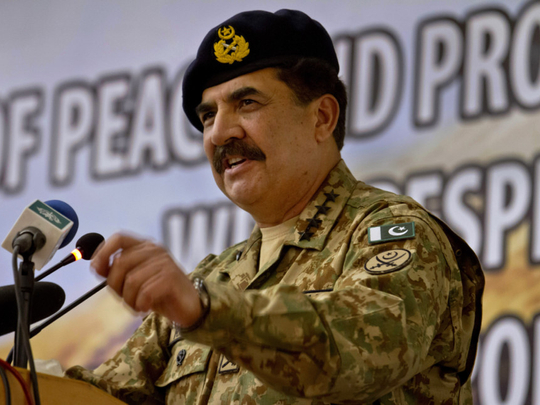
Pakistan’s army chief General Raheel Sharif’s call to end corruption as a pre-requisite to a conclusive victory against militants could not have been more timely.
In a landmark speech last week, the widely respected general said: “Enduring peace and stability [will not be established] unless the menace of corruption is uprooted.” As the man who has led the fight against Taliban militants who are now on the retreat, General Sharif’s words must be taken seriously.
In sharp contrast to the General stands the case of Pakistan’s Prime Minister Nawaz Sharif, who remains locked in what appears to be an increasingly futile defence of his children over recent allegations linking them to massive offshore wealth. Alongside revelations surrounding other leaders from different countries of the world in the wake of the so-called Panama Papers, came the case of the Pakistan premier’s two sons and daughter who have yet to come clean on exactly how they amassed their offshore wealth.
Though the prime minister went on public television to announce that his sons earned their millions through the sale of a family-owned steel business in Saudi Arabia, his remarks still have to be backed up by credible evidence.
General Sharif and Prime Minister Sharif, who are not related, remain poles apart in the latest follow-up to the Panama Papers. While General Sharif has just recently dismissed a handful of senior army officers, including at least one General, on charges of corruption, PM Sharif at best seems to have offered no more than mere lip service to his critics.
Coming clean
This controversy throws up a powerful question: Is there a new Pakistan in the making with such unprecedented disclosures and exactly how should the country deal with questions that are staring it in the face today?
Tragically, the civilian and democratic disposition led by the prime minister is yet to rise to the challenge. In an ideal world, the onus to come clean should first fall on the prime minister. Rather than just appointing a commission under a retired judge to investigate the matter, which is what the prime minister has done, he should have felt compelled to publicly offer evidence of the source of his children’s offshore wealth.
At stake was not just the matter of appointing a commission to probe this matter, but more importantly, a credible investigation must have been allowed to proceed, alongside responding to a largely sceptical public across Pakistan, for whom the country’s ruling politicians have practically lost all respect.
To date, the most convincing case for moving forward has been presented by Imran Khan, the former cricket captain-turned politician. His insistence on public disclosure of the paper trail between one of the world’s most expensive properties in central London, used by the prime minister’s children, and the original source of the funds, needs to be acknowledged.
It is not enough to settle the matter just by relying on the prime minister’s statement. It is now the prime minister’s responsibility to also provide verifiable evid-ence to back his claim.
At the same time, it is also vital for the Nawaz Sharif-led ruling structure to strengthen institutions that are responsible for tackling corruption. Present-day Pakistan may be a democratic country, yet, concerns over matters related to corruption have constantly dogged members of the ruling structure, who have not been accountable for their actions.
Pakistan has been surrounded by major corruption-related scandals in recent years too. Tragically though, the most prominent among those accused in the previous cases appear to have gotten off scot-free. It is now incumbent upon the members of the country’s parliamentary structure to review the previous cases and the controversy raging today with a view to taking major remedial steps. Beyond just saving his children in the ongoing scandal, the prime minister needs to consider the future of Pakistan’s ruling structure and democracy. Today, the reputation of the country’s democratic order lies in tatters. The Panama Papers have unleashed one of the biggest embarrassments for any Pakistani ruler in the country’s 69-year history.
Meanwhile, General Sharif’s decision to dismiss senior army officers who were found guilty of corruption has indeed further lifted his credentials across Pakistan. While events so far have proven that the army, as an institution, functions with a tight enough mechanism for probing its senior figures, the reverse seems to be true for the civilian structure.
Confidence in democracy
In a country that embarked once again on the road to democracy just eight years ago, when former president General Pervez Musharraf stepped down, events of today have hardly helped to inspire popular confidence in democracy. Politicians such as PM Sharif have often claimed to be defenders of democracy, but their actions have proved to be otherwise.
But a more serious implication is the matter of the linkages between corruption and the future of militancy, which once threatened the very existence of Pakistan. Without an aggressive push to change Pakistan’s outlook, the danger of militancy still looms.
Corrupt practices include obvious loopholes that continue to facilitate unchecked flow of funds to a range of players, including militants.
Are Pakistan’s politicians capable of transforming the country for the better or should the army take charge of the battle against corruption too?
While the country’s prime minister may choose to ignore that question, driven by self-interest, the question nonetheless remains paramount on the streets of Pakistan today.
Farhan Bokhari is a Pakistan-based commentator who writes on political and economic matters.








